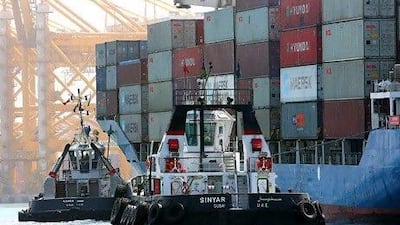The flow of goods in and out of the UAE defied global headwinds to surge 25 per cent to a record high of Dh1 trillion (US$272.24 billion) last year, said a senior trade official.
Despite the euro-zone crisis, the non-oil trade data for the single-currency bloc was also strong, with exports to troubled Greece rising by about 67 per cent, said Abdullah Al Saleh, the undersecretary of the Ministry of Foreign Trade. The data does not include figures for free zones, where trade rose 19 per cent for the year.
Demand for the country's goods - including gold and plastics - also held up well as exports rose 36 per cent.
"We are on the track of recovery, but growth is still positive," Mr Al Saleh said. "In 2009 we witnessed a drop in non-oil trade by 14 per cent and a recovery by 14 per cent in 2010."
Last year's rise means the value of non-oil trade has now passed the previous record of 2008 before the global financial crisis sapped demand for goods.
The Government has made raising the level of the country's non-oil trade, particularly exports, a cornerstone of efforts to diversify the economy.
A big factor in last year's rise was the strength of the UAE's commercial links with the faster-growing economies of India, China, Hong Kong and Singapore, which account for more than half of trade.
"The economies of Asia have remained fairly robust, helping the UAE's exports hold up well," said Khatija Haque, the senior economist at Emirates NBD.
High commodity prices last year were also likely to play a part in the rise, she said. Prices of a wide variety of commodities, including gold and wheat, soared in the first half of the year. Gold is one of the UAE's leading exports after oil.
But officials also point to the robustness of ties with the indebted euro zone, which accounts for about 20 per cent of trade. At the start of the year, there had been concern the unfolding turmoil in the euro zone would dent UAE trade.
But trade with Germany, France, Belgium and Italy, which together make up 80 per cent of total UAE trade with the euro zone, rose 25 per cent, said Mr Al Saleh. Export growth was a big factor in the rise, he said.
The weakness of the euro against the US dollar contributed to the rise in the value of imports from the euro zone to the UAE falling from average annual growth of 35 to 40 per cent to less than 30 per cent last year, he said.
The dirham's peg to the strengthened dollar has helped to bring down the cost of importing goods to the UAE.
"The competitive advantage of our export products in terms of quality and pricing was important," he said. "We have expanded the industrial sector mainly in aluminium and petrochemicals, plastics, ceramics and processed foods."
Officials expect a more modest rise in trade this year as a painful recession in the euro zone and cooling growth in Asia drag on demand for goods.
"Because the world economy has uncertainty, our expectation for 2012 is a 15 to 20 per cent growth for non-oil and non-free zone," Mr Al Saleh said. "There is an expectation in drop in euro-zone GDP and a drop in China and India GDP."
A tightening of sanctions against Iran may also affect trade flows, he said. Non-oil trade with Iran rose 35 per cent in the first nine months of last year, he said.
The flow of goods from Dubai to Iran was falling "day by day", Hamad Buamim, the director general of Dubai Chamber of Commerce and Industry, said last week.
"In the existing situation there is growth, but in the worst-case scenario of more sanctions, the most affected sector will be re-exports," said Mr Al Saleh.
Iran is a major destination for UAE non-oil goods, with 3 per cent of exports and 6.8 per cent of re-exports headed to the country.
twitter: Follow our breaking business news and retweet to your followers. Follow us

